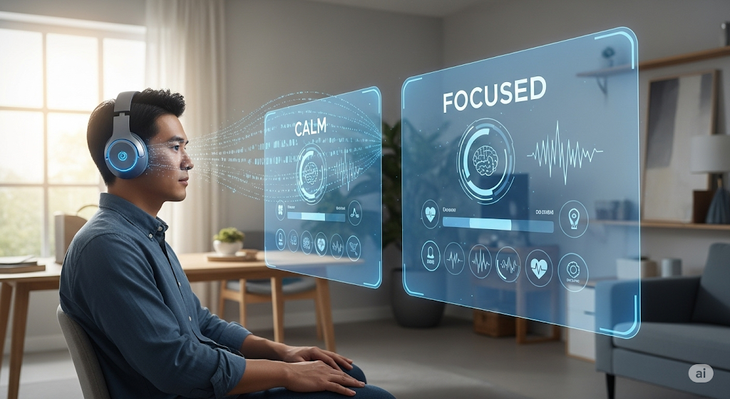
Smart headphones help users track mental health indicators
Headphones are a familiar device that many people wear for hours every day, from work to travel to relaxation. But now, they are no longer just for listening to music but are gradually becoming a mood tracking tool.
Headphones are not just for... listening
Smart headphones are moving beyond their traditional role to become tools for monitoring mental states. From labs to prototypes, they are embedded with biosensors that pick up signals related to the wearer’s emotions.
One example is a wearable device developed by a team at Cornell University that tracks facial muscle movements by bouncing sound waves off the skin. While it cannot directly measure stress levels, the device has shown that it can track signals related to mental states through facial expressions such as smiling or frowning.
When Headphones Become Personal Medical Devices
Moving beyond the ability to recognize emotions, smart headphones are moving closer to the role of a personal medical support device. Instead of just measuring individual heart rates or brain waves, some development projects are aiming to integrate multiple biosensors to analyze mental states continuously and more comprehensively.
According to Tuoi Tre 's research, companies like Apple and Bose have both registered patents related to headphones with integrated biosensors, showing that both are testing devices capable of measuring heart rate, skin temperature and head movement.
These sensors, typically placed in the ear, can record emotional or stress-related indicators. While not yet commercially available, these prototypes show the growing trend of headphones becoming personal health tools.
On the research side, a headset developed by the company Neurable has shown the ability to detect the wearer’s concentration level through brain waves, thanks to contact points near the ear. The device operates completely autonomously and can provide feedback when it detects signs of distraction, opening up the potential for monitoring mental state during everyday headphone use.
Another study, published on the arXiv platform in early 2024, presented an earpiece with an optical sensor to detect stress. In a test model with 14 participants, the stress classification system achieved 91% accuracy and performed consistently. Although still in its early stages, this result opens up the prospect of using headphones as a tool to support early detection of emotional instability through biological signals.
If widely disseminated, studies like the above could help ordinary headphones become a daily mental monitoring tool, especially suitable for young people who often use headphones for studying, working and entertainment.
Useful but limited
Despite their potential, headset-based emotion monitoring devices should be viewed as a supplementary tool, not a substitute for professional judgment. They may suggest abnormalities, but diagnosis and treatment should be performed by a qualified physician in a formal medical setting.
In addition, the collection of biological data such as heart rate, brain waves or emotional responses also raises privacy issues. Device developers will have to demonstrate their ability to secure personal information, as well as be transparent about how they store and use users' sensitive biological data.
In the not too distant future, headphones may not only be audio accessories but also a 'silent companion' for daily mental health.
Source: https://tuoitre.vn/tram-cam-lo-au-co-the-duoc-phat-hien-qua-tai-nghe-thong-minh-20250731173303715.htm



































































































Comment (0)